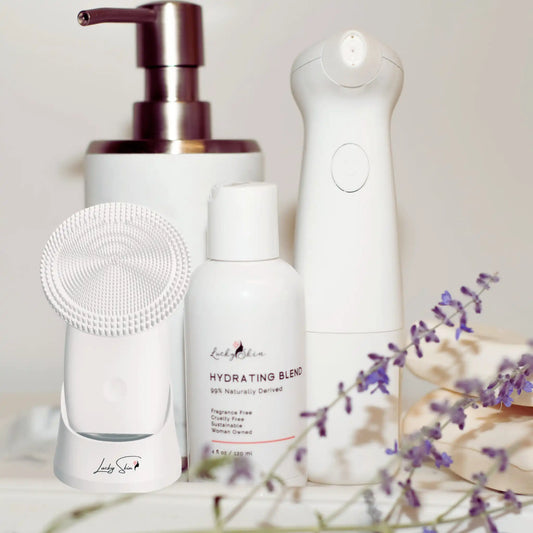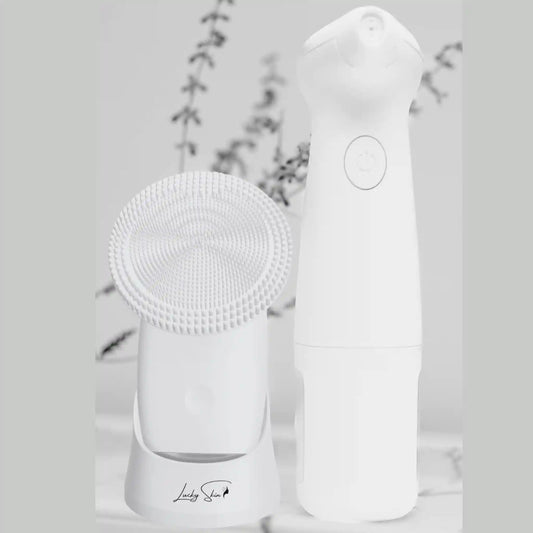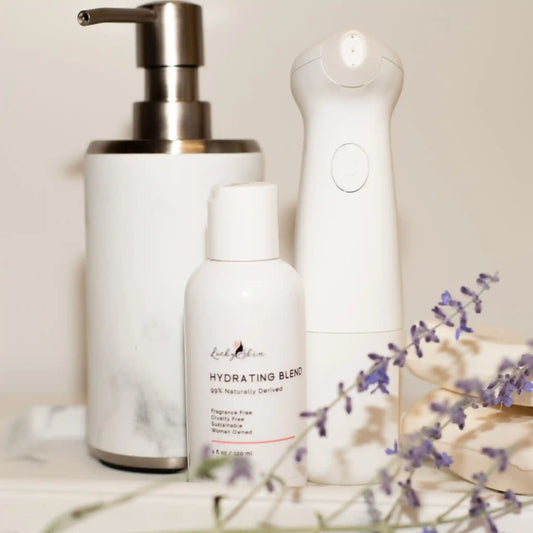How Skin Care Works
Share
Understanding How Skin Care Works
In this blog post, we delve into the fundamentals of how skin care works. Let's explore the science behind skincare products and routines and, overall, how skin care works.
The Importance of a Skin Care Routine
Maintaining a regular skincare routine is essential for keeping your skin healthy and youthful. A good skincare routine can help prevent common skin issues such as acne, dryness, and premature aging. Here are some key steps to include in your skincare routine:
- Cleansing: Cleansing your skin helps remove dirt, oil, and impurities that can clog pores and lead to breakouts.
- Exfoliating: Exfoliating removes dead skin cells, revealing fresh, glowing skin underneath.
- Moisturizing: Moisturizing is essential for all skin types, even if you have oily skin. A good moisturizer helps to hydrate the skin, maintain its moisture barrier, and prevent issues like dryness and premature aging. Choose a moisturizer that is appropriate for your skin type and apply it both in the morning and evening. Don't forget to include SPF in your daytime moisturizer to protect your skin from harmful UV rays.
How Ingredients in Skin Care Products Work
Understanding how ingredients in skin care products work is essential for choosing the right products for your skin. Ingredients like retinol help boost collagen production, reducing the appearance of wrinkles. Hyaluronic acid hydrates the skin by attracting and retaining moisture, making it plump and youthful looking. Antioxidants like vitamin C protect the skin from environmental damage, such as UV rays and pollution. It's important to know how these ingredients function to tailor your skincare routine to your skin's specific needs.
Common Ingredients and Their Benefits
In the vast world of skincare products, it's easy to get overwhelmed by the countless ingredients listed on the back of each bottle or jar. But fear not, dear reader, for today we are going to delve into the fascinating world of common skincare ingredients and uncover their incredible benefits for your skin.
1. Hyaluronic Acid
Hyaluronic Acid is a powerhouse ingredient known for its incredible hydrating properties. It has the ability to hold up to 1000 times its weight in water, making it a must-have for plump, hydrated skin. This ingredient helps to improve skin's elasticity, smooth out fine lines and wrinkles, and give your complexion a healthy, dewy glow.
2. Vitamin C
Vitamin C is a potent antioxidant that can help brighten the skin, even out skin tone, and protect against environmental damage. It also stimulates collagen production, which can help to firm and plump the skin. Incorporating Vitamin C into your skincare routine can help to achieve a radiant and youthful complexion.
3. Retinol
Retinol, a form of Vitamin A, is a powerhouse ingredient when it comes to anti-aging skincare. It helps to increase cell turnover, promote collagen production, and reduce the appearance of fine lines and wrinkles. Using retinol regularly can help to improve skin texture, tone, and overall youthfulness.
4. Niacinamide (Vitamin B3)
Niacinamide is a versatile ingredient that can benefit a wide range of skin concerns. It helps to improve the skin's barrier function, reduce inflammation, and regulate oil production. Niacinamide is also known for its ability to fade dark spots, minimize pore size, and improve overall skin texture.
Choosing the Right Products for Your Skin Type
In a world filled with endless skincare options, it can be overwhelming to choose the right products for your skin type. With so many products promising to deliver flawless skin, how do you know which ones will actually work for you? The key is to understand your skin type and select products that cater to its specific needs.
Why Your Skin Type Matters
Before diving into the topic how skin care works, it's essential to identify your skin type. Your skin type plays a crucial role in how it reacts to different ingredients and formulations. There are five common skin types:
- Normal: Well-balanced skin that is neither too oily nor too dry.
- Dry: Lacks moisture and can feel tight or flaky.
- Oily: Prone to excess sebum production, leading to shine and potential breakouts.
- Combination: A mix of oily and dry areas, often with an oily T-zone and dry cheeks.
- Sensitive: Easily irritated and prone to redness or reactions.
When trying to figure out how skin care works, it's important to understand your skin type. It will help you narrow down the vast array of products on the market and choose ones that are tailored to address your specific concerns.
Skin Care Techniques and Practices
Cleansing
The first step to any effective skincare routine is cleansing. Cleansing your skin helps to remove dirt, oil, and impurities that can clog pores and lead to breakouts. Opt for a gentle cleanser that is suitable for your skin type, whether it's oily, dry, combination, or sensitive. It's important to cleanse your skin twice a day - once in the morning and once at night - to maintain a clear complexion.
Exfoliating
Exfoliating is a crucial step in any skincare routine as it helps to slough off dead skin cells, unclog pores, and improve skin texture. There are two types of exfoliations: physical exfoliation, which uses scrubs, brushes or devices (like Lucky Skin Hydro, hydro dermabrasion system for home use) to manually remove dead skin cells, and chemical exfoliation, which uses acids like AHAs and BHAs to dissolve dead skin cells. Remember to exfoliate no more than 1-2 times a week to avoid over-exfoliation, which can damage the skin barrier.
Moisturizing
Moisturizing is essential for keeping your skin hydrated, soft, and supple. Even if you have oily skin, it's important to use a lightweight, non-comedogenic moisturizer to prevent your skin from becoming dehydrated. Look for ingredients like hyaluronic acid, glycerin, and ceramides to lock in moisture and strengthen the skin barrier. Apply moisturizer twice a day, after cleansing and exfoliating, to maintain optimal skin health.
Sun Protection and Anti-Aging Practices
Sun protection is crucial in skincare routines due to the harmful effects of UV rays. Exposure to the sun can lead to premature aging, wrinkles, and skin cancer. Incorporating sunscreen into your daily routine can help protect your skin from these damaging effects and maintain its health and youthful appearance.
Skin Care Routines for Different Skin Concerns
Acne-Prone Skin
When dealing with acne-prone skin, it's essential to incorporate gentle cleansing to avoid aggravating breakouts. Using non-comedogenic products helps prevent clogged pores, while incorporating ingredients like salicylic acid can help target acne-causing bacteria. Additionally, moisturizing with oil-free products can help maintain skin hydration without adding excess oil to the skin. Combining these steps with targeted treatments can help manage acne-prone skin effectively.
Dry Skin
- Use Hydrating Ingredients: Look for products with hyaluronic acid or glycerin to lock in moisture and keep your skin hydrated.
- Avoid Harsh Cleansers: Steer clear of products with alcohol or fragrance, as they can further dry out your skin.
- Moisturize Regularly: Use a rich, emollient moisturizer to keep your skin supple and prevent dryness.
Taking these steps in your skin care routine can help address the specific needs of dry skin and keep it healthy and nourished.
Aging Skin
Hydrating products are essential for aging skin as they help maintain moisture levels, reducing the appearance of fine lines and wrinkles. Retinol is a powerful ingredient that aids in boosting collagen production, improving skin texture, and reducing signs of aging. Sunscreen is crucial to protect aging skin from harmful UV rays that can accelerate skin aging. Incorporating these three elements into a skincare routine can help address various concerns associated with aging skin.
Lifestyle Factors that Impact Skin Health
Our skin is a reflection of our overall health, and various lifestyle factors can significantly impact its appearance. Factors such as diet, hydration, sleep, stress levels, and sun exposure all play a crucial role in the health of our skin.
- Diet: Eating a balanced diet rich in fruits, vegetables, and healthy fats can provide essential nutrients that support skin health.
- Hydration: Staying hydrated is key to maintaining skin elasticity and promoting a healthy complexion.
- Sleep: Lack of sleep can lead to dull, tired-looking skin, as our skin cells regenerate during sleep.
- Stress: Chronic stress can trigger inflammation in the skin, leading to various skin issues.
- Sun Exposure: UV rays from the sun can accelerate skin aging and increase the risk of skin cancer.
By addressing these lifestyle factors and making positive changes, you can support your skin's health from the inside out.




